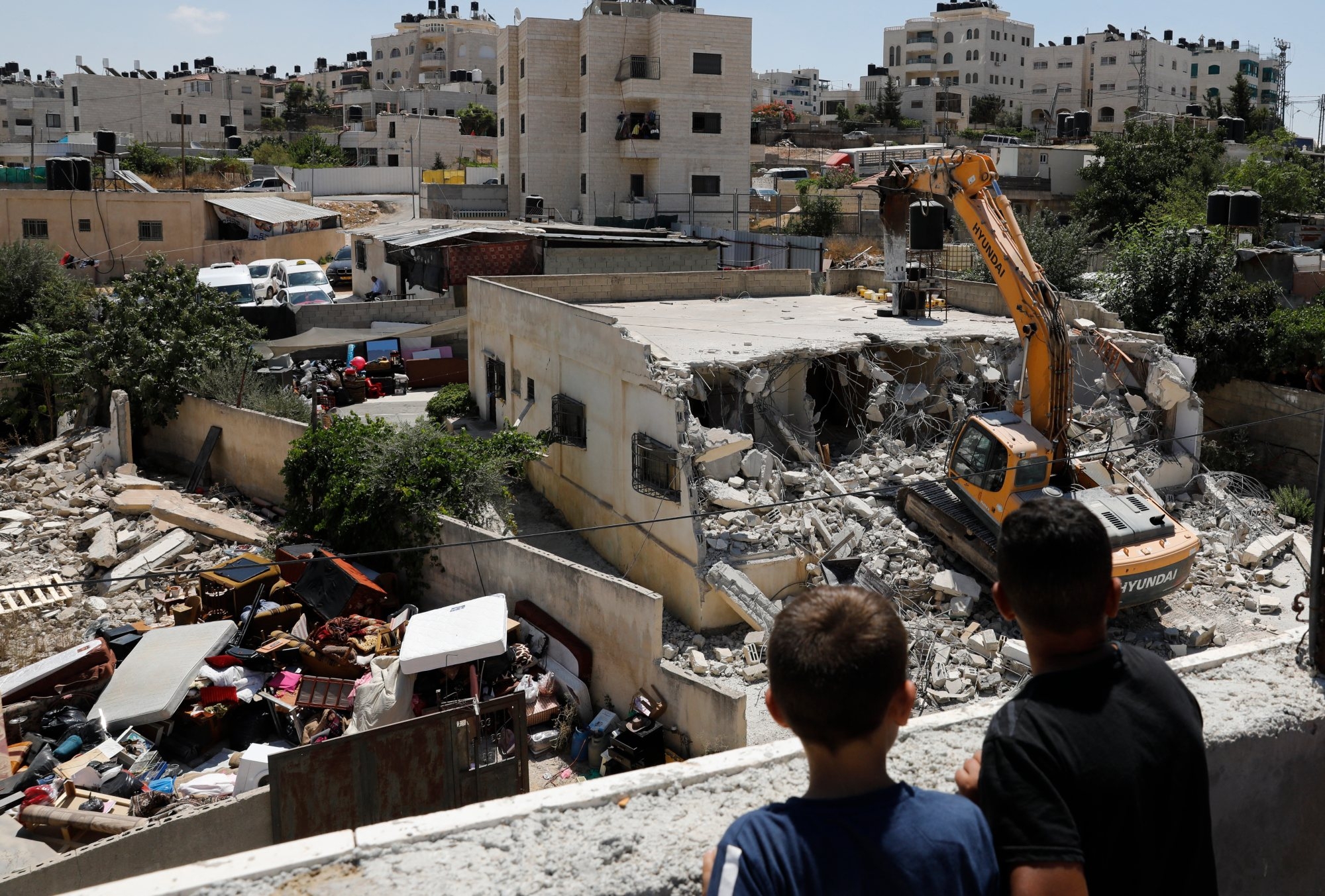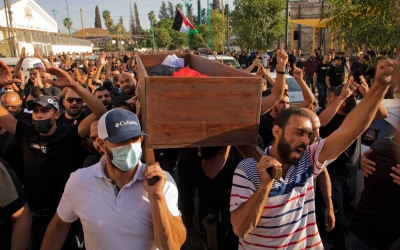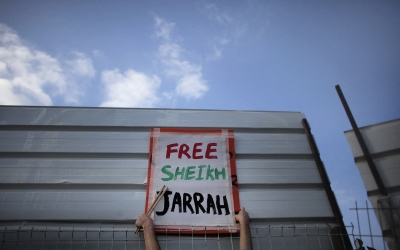Israel's Kaminitz Law: Can Mansour Abbas save Palestinian homes from demolition?

Benjamin Netanyahu may no longer be prime minister, but for Palestinian citizens of Israel, it's as if nothing has changed.
The so-called "government of change", cobbled together by far-right leader Naftali Bennett and right-centrist Yair Lapid, includes for the first time in Israel’s history one of the parties representing Palestinian citizens of Israel.
Raam party leader Mansour Abbas signed a deal with Lapid, the head of the Yesh Atid party, to join the coalition the eleventh hour after being promised that draconian legislation known as the “Kaminitz Law”, disproportionately affecting Palestinian construction without permits, would be frozen for two years.
"We will reclaim the lands that were expropriated from our people - this is a national cause of the first degree," Abbas said during his swearing-in as deputy minister on 13 June, speaking in Arabic before switching to Hebrew.
But mere days following the swearing-in of the new Israeli government, Palestinian citizens of Israel were still receiving demolition orders on their homes - including residents of the village of Khashim Zannih in southern Israel, and in Shefa-Amr, near the city of Haifa - highlighting that their struggle is far from over, even with a member of their community in government.
New MEE newsletter: Jerusalem Dispatch
Sign up to get the latest insights and analysis on Israel-Palestine, alongside Turkey Unpacked and other MEE newsletters
‘Second-class’ citizens
The United Arab List, or Raam, won four seats in the Israeli parliament, the Knesset, during the March election, turning it into a key player in cobbling together the razor-thin majority of the Bennett-Lapid coalition, composed of parties ranging from the left to the far right, from secular to religious.
Headed by Abbas - an Islamist unrelated to Palestinian Authority President Mahmoud Abbas - Raam joined a government led by Bennett - a right-wing, anti-Palestinian, pro-settlement Israeli politician who now serves as prime minister until 2023, as per an agreement within the coalition.
Abbas’s precondition to joining the government on the basis of a moratorium on the Kaminitz Law was a key concern for Palestinian citizens of Israel, who at 1.9 million strong make up 21 percent of the population of the country.
During the establishment of the state of Israel in 1948 - known to Palestinians as the Nakba, or “catastrophe” - an estimated 800,000 Palestinians were forcibly expelled from their homes, fleeing to the West Bank, Gaza, or abroad, while some 150,000 others would remain in the 78 percent of historic Palestine granted to Israel by British colonial powers.
Since then, those who would become Palestinian citizens of Israel have been targeted by scores of discriminatory laws and policies treating them as “second class citizens” compared to their Jewish counterparts, including through the decried nation-state law of 2018.
Key among the issues they have had to face is unequal access to land, infrastructure, and housing.
According to Mossawa, an advocacy centre based in Haifa, the state of Israel has “allocated lands and provided planning services for over 600 Jewish communities since its establishment in 1948”, while only seven new towns have been established for Palestinian citizens of Israel during the same time frame, all in the Naqab - or Negev - desert.
With 93 percent of land in Israel owned either by the state, the Jewish National Fund, or Israel's Development Authority - all of which prioritise Jewish-Israelis - Palestinians inside Israel have been limited to their privately owned land upon which to build, even as the community has grown nearly eightfold since 1948.
Faced with the double bind of building permits being quasi impossible to obtain in towns with no approved construction master plan, while such plans being absent in Palestinian-majority areas, many Palestinians inside Israel have been left with illegal construction as their only option. But for those seeking to accommodate growing families, the Kaminitz law has been yet another threat.
Jamal Zahalka, the president of the National Democratic Alliance (Balad) party, believes that the deal signed between Abbas and Lapid is non-binding, mere ink on paper in order to form a government.
A proper freeze of Kaminitz law would have to go through the Knesset and ministries before taking effect, he argued.
“This is a Netanyahu government but without Netanyahu,” Zahalka told Middle East Eye, pointing out that four members of the new cabinet - Bennett, Lapid, Avigdor Lieberman and Gideon Saar - were once political disciples and allies of the outgoing premier, and hence unlikely to have much sympathy for the demands of the Palestinian community.
An amendment ramping up demolitions
What is known as the Kaminitz Law is in fact an amendment to the Planning and Building Law, legislation regulating land use dating back to the British Mandate, which was later ratified in Israeli law by the Knesset in 1965.
Amendment 116 was passed in 2017, with 44 MPs in favour and 33 against, and has since been known as the Kaminitz Law, in reference to Erez Kaminitz, the Israeli deputy attorney general who headed a special committee in 2016 looking into ways to tackle construction without permits in Israel and occupied East Jerusalem.
The Arab Joint List, the coalition of parties representing Palestinian citizens of Israel in the Knesset, has objected to the Kaminitz law since it was only a bill in 2016, lobbying hard to have it taken down.
But the passage of the amendment brought almost 50,000 homes owned by Palestinian citizens of Israel and Palestinian residents of East Jerusalem under threat of demolition and hefty fines.
Zahalka, who was a member of the Knesset when the Kaminitz amendment was approved, told MEE that Netanyahu's government had been the driving force behind the passage of Amendment 116.
“While he was in China, Netanyahu called and asked about what was happening with the law, saying that it needed to be voted on as soon as possible,” Zahalka, who was removed from a Knesset session in April 2017 for objecting to the vote, told MEE.
Amendment 116, which is included in the “oversight, enforcement and penalties” section of the Israeli Planning and Building Law, gives executive authorities the power to issue hefty penalties, seize building equipment and vehicles, issue demolition and stop-work orders, and arrest people - all without referring to the judicial system.
Prior to its passage, Israeli authorities had to submit a request to a court in order to issue a demolition order, Samer Soueid, the director of The Arab Centre for Alternative Planning (ACAP), explained.
“This meant a long legal process, as the court would need to hear the owner of the house built without a permit, who could also appeal authorities' request for a home demolition,” Soueid told MEE.
Amendment 116 cut this process short by skipping the legal step, limiting courts’ authority over reviewing administrative rules, while empowering inspectors and municipal civil servants to issue demolition orders and fines.
“The most dangerous thing about the Kaminitz Law is that it effectively cancels the authority of courts and gives it to the executive, which applies the law without overview by the judiciary,” Soueid said.
Myssana Morany, a lawyer and coordinator for the land and planning unit at Adalah, the legal centre for Palestinian minority rights in Israel, told MEE that the regions most severely affected by the amendment included the Naqab, East Jerusalem and the Galilee.
In 2019, Israel reportedly demolished 2,241 structures belonging to Palestinians citizens of Israel in the Naqab alone. Some 75,000 Palestinian Bedouins live in 45 towns in the Naqab deemed “unrecognised” by the Israeli government. In the absence of master plans, these villages lack properly paved roads, sidewalks, sewage systems, schools, parks, electricity and water supplies, as well as access to public transportation.
One of these unrecognised villages, al-Araqib, has been demolished by Israeli authorities 186 times as of April.
Meanwhile, Israel demolished 170 houses in East Jerusalem in 2020, leaving 400 Palestinian residents without shelter amid settlement expansion projects in neighbourhoods such as Sheikh Jarrah.
Soueid told MEE that fines rose from an average of 70,000 shekels ($21,500) to 315,000 shekels ($91,500) under the Kaminitz amendment, with the deployment of police units and government demolition charged to homeowners targeted by demolition for up to $100,000.
“Not only that,” Soueid said, “Anyone who facilitates building a house without a permit could have his equipment seized, whether a cement mixer, a crane, or something else… This has led engineers, builders and construction suppliers to ask to see the building permits before starting to work, because they do not want to put their businesses in jeopardy.”
Morany added that, in order to avoid additional costs - particularly crippling for Palestinian citizens of Israel, half of whom live under the poverty line - many have turned to demolishing their homes themselves.
The targeting of Palestinian-majority towns has had an unintended effect, however, Zahalka pointed out.
“The hefty fines are suffocating people, and some have left Arab towns to live in mixed towns such as Nof HaGalil, Haifa, Ramla….” he said. “This has created a demographic dilemma for Israel.”
Barred from building in their communities, and viewed as a threat to the “Jewish character” of other cities and towns, Palestinian citizens of Israel find themselves inexorably squeezed.
The moshav dilemma
In November 2020, Amendment 116 was subjected to a two-year "moratorium" - not because of the legislation’s demonstrably destructive impact on the Palestinian community inside Israel, but after some Jewish-Israelis protested that they too were affected.
Communities known as moshavim emerged prior to 1948, established as Jewish farming settlements in Mandate-era Palestine. Over the decades, however, moshav residents have abandoned agriculture for other forms of employment, leaving vast tracts of agricultural land unused.
Subsequently, residents of the moshavim have sought to use the land for different purposes. “Some of them built hotels, swimming pools or wedding halls, which are not authorised under a master plan, and this brought them under the Kaminitz law and its fines,” Morany explained.
The complaints of moshav residents reached far-right politician Ayelet Shaked - then the justice minister and now serving as minister of interior - who vowed to ease the legal penalties affecting Jewish-Israelis.
“When we passed the Kaminitz Law, the goal was to toughen the enforcement over illegal construction mainly in the Arab sector,” she said during an interview in December 2019, referring to the Palestinian community of Israel.
"I do not want to cancel the law, because it led to good results in the Arab sector, but we need to see how we can change the law,” she added, lamenting that Amendment 116 was “overly onerous toward residents of moshavim”.
In November 2020, Israel’s Attorney General Avichai Mandelblit issued a statement saying that the “policy of enforcement” of the Kaminitz law would change. Though hailed as a de facto freeze of Amendment 116, Mandelblit did not explicitly state as such.
Instead, the statement ranked different types of illegal construction, putting “non-agricultural purposes”, such as hotels and pools, last - effectively meaning illegal construction in moshavim would be at the bottom of Israeli authorities’ priorities in terms of enforcing Amendment 116.
Meanwhile, Soueid said some 7,000 homes built by Palestinian citizens of Israel are currently next in line on the enforcement list and at imminent risk of demolition.
“This is Zionist planning in the interest of Israeli Jews,” Zahalka said. “Fewer Arabs and more lands, that's it."
Middle East Eye delivers independent and unrivalled coverage and analysis of the Middle East, North Africa and beyond. To learn more about republishing this content and the associated fees, please fill out this form. More about MEE can be found here.








